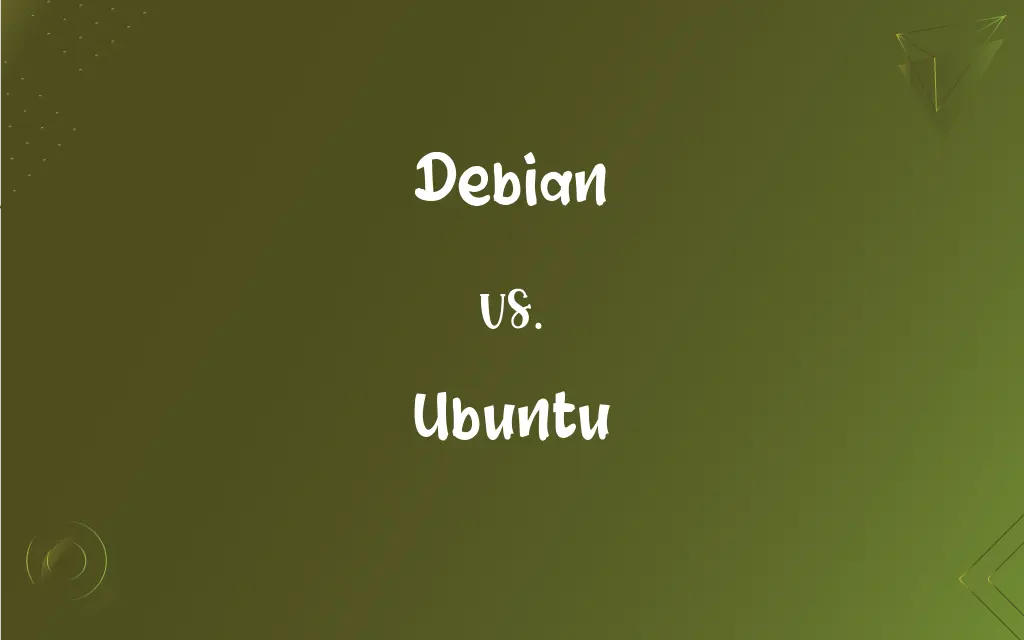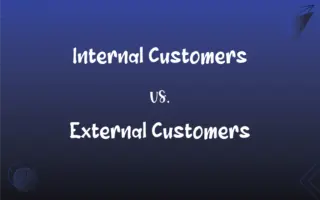Debian vs. Ubuntu: What's the Difference?
Edited by Aimie Carlson || By Harlon Moss || Updated on October 23, 2023
Debian is a free, open-source operating system; Ubuntu is a popular derivative of Debian with added user-friendly features.

Key Differences
Debian is a free operating system that's been around since 1993, acting as a foundation for many other distributions. Ubuntu, introduced in 2004, is based on Debian but focuses on providing a more polished and user-friendly experience.
Debian has a reputation for stability and reliability, often used in server environments. Ubuntu, while also suitable for servers, has gained popularity as a desktop OS due to its user-friendly nature and active community support.
Updates in Debian are categorized into Stable, Testing, and Unstable branches, allowing users to choose their preferred balance between cutting-edge features and stability. Ubuntu, however, releases new versions every six months, with Long-Term Support (LTS) editions every two years.
One key difference lies in their package management. While both use the apt package management system, Ubuntu adds its own software repositories, distinct from Debian's repositories, often including newer or modified packages.
Debian follows a strict free software philosophy, avoiding non-free software in its main repository. Ubuntu, while based on open-source principles, incorporates some proprietary drivers and software for enhanced user experience.
ADVERTISEMENT
Comparison Chart
Foundation
Original, since 1993
Based on Debian, since 2004
Focus
Stability and free software philosophy
User-friendliness and broader hardware compatibility
Update Frequency
Stable, Testing, Unstable branches
Every six months with LTS every two years
Software Repositories
Debian's repositories
Own repositories with newer/modified packages
Proprietary Software
Avoids in main repository
Incorporates some for enhanced user experience
ADVERTISEMENT
Debian and Ubuntu Definitions
Debian
Acts as a foundation for various Linux distributions.
Many popular Linux distributions are derived from Debian.
Ubuntu
Released in versions every six months with LTS editions.
The latest Ubuntu LTS release ensures five years of security updates.
Debian
Known for its stability and reliability.
Many servers run Debian because of its rock-solid performance.
Ubuntu
Combines free software with some proprietary solutions.
Ubuntu includes proprietary drivers to ensure maximum hardware compatibility.
Debian
Offers multiple branches for updates.
Debian's Testing branch offers a blend of stability and newer software.
Ubuntu
Features its own software repositories.
Ubuntu's repositories provide a curated set of applications for users.
Debian
A free, open-source operating system.
Debian has been a cornerstone in the Linux community for decades.
Ubuntu
A popular open-source operating system based on Debian.
Ubuntu has become one of the most user-friendly Linux distributions.
Debian
Adheres strictly to free software principles.
Debian's main repository only contains free and open-source software.
Ubuntu
Supported by Canonical Ltd. and a vast community.
The Ubuntu community actively contributes to its development and support.
Ubuntu
A philosophical doctrine or approach to life that emphasizes social unity and generosity of spirit.
Ubuntu
(South Africa) A Nguni Bantu ideology focusing on people's allegiances and relations with each other.
FAQs
Can I use Ubuntu for servers?
Yes, there's a specific Ubuntu Server edition tailored for such needs.
Which is older, Debian or Ubuntu?
Debian is older, originating in 1993, while Ubuntu was introduced in 2004.
Are applications compatible between Debian and Ubuntu?
Mostly, but due to different repositories and versions, some applications might require adjustments.
Can I switch from Debian to Ubuntu easily?
While they share similarities, a fresh installation is usually recommended when switching.
How often is Ubuntu updated?
Ubuntu releases new versions every six months, with LTS versions every two years.
Which is better for desktop use, Debian or Ubuntu?
Both can be used, but Ubuntu is specifically tailored for desktop users with its user-friendly features.
Why is Debian considered more stable?
Debian's Stable branch focuses on thoroughly tested software, ensuring reliability.
Who maintains Ubuntu?
Canonical Ltd. oversees Ubuntu's development, with community involvement.
Why might someone choose Debian over Ubuntu?
They might prioritize stability, free software principles, or have specific requirements that Debian meets.
Can I contribute to both Debian and Ubuntu?
Absolutely! Both have vibrant communities that welcome contributors.
Is Debian's Testing branch similar to Ubuntu's regular releases?
Somewhat. Debian Testing offers newer software than Stable but isn't directly comparable to Ubuntu's timed releases.
Do both distributions support the same architectures?
Largely, yes, but there might be variations in specific support.
Is Ubuntu a version of Debian?
Ubuntu is based on Debian but is a distinct distribution with its own features.
Is Debian suitable for beginners?
Debian can be used by beginners, but Ubuntu is often recommended due to its user-friendliness.
Which has a larger community, Debian or Ubuntu?
Both have large communities, but Ubuntu's is notably active, especially for beginners.
Is Ubuntu's desktop environment different from Debian's?
By default, Ubuntu uses GNOME (earlier Unity), while Debian offers multiple choices, with GNOME being standard.
Do both use the same package manager?
Yes, both use the apt package management system.
What's the main difference in their repositories?
Ubuntu has its own repositories with some newer or modified packages compared to Debian.
How do proprietary software views differ between Debian and Ubuntu?
Debian strictly avoids proprietary software in its main repository, while Ubuntu includes some for enhanced compatibility and experience.
What's the primary philosophy behind Debian?
Debian emphasizes free software, ensuring all software in its main repository is open source.
About Author
Written by
Harlon MossHarlon is a seasoned quality moderator and accomplished content writer for Difference Wiki. An alumnus of the prestigious University of California, he earned his degree in Computer Science. Leveraging his academic background, Harlon brings a meticulous and informed perspective to his work, ensuring content accuracy and excellence.
Edited by
Aimie CarlsonAimie Carlson, holding a master's degree in English literature, is a fervent English language enthusiast. She lends her writing talents to Difference Wiki, a prominent website that specializes in comparisons, offering readers insightful analyses that both captivate and inform.
































































